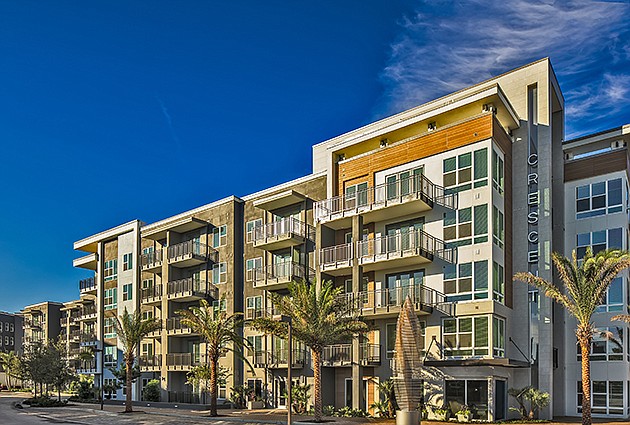- November 25, 2024
-
-
Loading

Loading

Five years into a nearly unprecedented multifamily rental growth cycle, the economic laws of nature should be signaling that the sector is due for a correction.
But a trio of decidedly different recent apartment deals in the Tampa area indicate investor demand for rentals along the Gulf Coast — even at high-dollar prices — shows few signs of waning.
Each of the three deals — Crescent Westshore, Grand Reserve at Tampa Palms and the Bayview Apartments — involved out-of-state buyers interested in expanding existing footprints in Florida.
Each also hopes to capitalize on the region's growing population, job gains, an increased desire to rent rather than own and the emergence of “live-work-play” environments.
“The area just feels so strong,” says J.M. Schapiro, CEO of Continental Realty Corp., a Baltimore-based company that owns apartments and commercial properties in seven states, including 15 projects in Naples, Orlando, Destin and elsewhere in Florida.
“We've been looking at the Tampa market for quite a while now, but Grand Reserve was the first property we were able to take over the finish line.”
Grand Reserve, a 390-unit, garden-style complex on 41 acres built in 1999, sold for $65.5 million.
Schapiro says Continental plans roughly $4 million in improvements to the 16616 Palm Royal Drive complex's interiors and common area amenities, which currently include sand volleyball courts and gas fireplaces along with more traditional accoutrements as a swimming pool, fitness center and storage units.
Investors like Continental have been attracted to the Tampa apartment market because of historically high occupancy rates and robust annual rental growth since the end of the previous decade's recession.
Tampa, for instance, boasts 96% average occupancy for multifamily rentals, and the area has experienced annual rent increases of 6.8% -- far outpacing annual inflation.
Those market dynamics also appear to have driven Cottonwood Residential's recent $77.5 million purchase of the Bayview Apartments, at 235 Third Ave. N. in St. Petersburg, and Nicol Investment Co.'s $80 million deal for the 374-unit Crescent Westshore.
Neither Cottonwood nor Nicol officials returned telephone calls for comment on their acquisitions.
Like Continental, Nashville-based Nicol appears to be seeking to enter the Florida market in a greater way. Late last year, it acquired a complex in Altamonte Springs for $49 million, records show.
Unlike Grand Reserve, which has been open for nearly two decades and is close to existing suburban employment centers like the Highwoods Preserve Corporate Campus and the Hidden River Corporate Park, Crescent Westshore was completed just last September.
Demand, however, has been strong. Fully half of the units in the 2202 Lois Ave. project have been rented in the five months since it was completed.
In all, the 42-year-old Nicol has invested roughly $350 million since 2013 in multifamily and mixed-use projects in Nashville, Cincinnati and Florida.
“The reception we received in the Westshore market was fantastic,” says Jay Curran, a senior vice president with Crescent Communities, the complex's developer. “We'd only been open since September, but we were doing 35 leases a month.”
CBRE Inc.'s Sean Williams and Malcolm McComb represented Crescent in the sale. Curran notes that Nicol acquired its Altamonte Springs project from Crescent, as well, which helped negotiations for the Westshore community proceed smoothly.
“Our units skewed somewhat smaller, but we found that worked really well for professionals seeking one-bedroom apartments, in particular,” Curran says.
That's also the case at Bayview, the former Modera Prime apartment tower in downtown St. Petersburg. The eight-story building, with 309 units, opened in 2014.
It features a pair of rooftop decks with views of the water and downtown, along with more standard amenities such as a fitness center and social spaces. Units rent for $1,285 per month for a studio unit to more than $3,000 monthly for a two-bedroom apartment.
Grand Reserve, conversely, features unique four-bedroom apartments measuring up to 1,800 square feet, and an average unit size of 1,213 square feet — which Continental says are among the largest in the submarket.
“I'm a big fan of space,” Schapiro says. “The trend toward more micro-sized units works well in some cases in urban areas, but for a suburban project we think there's a segment of the population that really treasures having some room to breathe and move.”
But with the frenzied investor interest in multifamily projects has come price appreciation that some analysts believe isn't sustainable. And while rent growth has topped 5% annually in the region for the past three years, apartment lenders and others have tightened their criteria against anticipated slowdowns in future hikes.
As a result, some deals that counted on rent hikes to pay acquisition loans may have trouble going forward.
Even so, neither Schapiro nor Curran share the view that the apartment sector in Tampa is in danger of imploding.
“As long as there's continued job growth in this area, and we believe there will be, there will be an increased need for new housing,” Curran says. “Rent growth has slowed from the really robust years of 2015 and 2016, but it's still really positive.”
“We own for the long term,” Schapiro says. “And in the case of Grand Reserve, there are great schools and offices around it and other drivers. We'll treat the property and the residents well and we think
that will continues to attract residents to the community.”
Curran, too, notes the Crescent Westshore disposition doesn't mean the Charlotte, N.C.-based company plans to exit the Tampa market.
It recently began work on a 394-unit complex that will be called Crescent Riverwalk when completed in early 2018.
“We're still very bullish on the Tampa market,” he says. “And we're still looking for additional development opportunities there.”